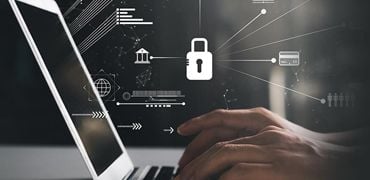What is a Human Firewall: Why is it Important and How to Use it

A human firewall is an important component of a company’s overall security strategy, as employees can play a crucial role in preventing cyberattacks. With cyberthreats becoming a major concern for businesses, human error accounts for a staggering 95% of cyberattacks. In such instances, the human firewall acts as a great supplement to cybersecurity measures to help mitigate the threats. But what is a human firewall? In this article, we tell you all about it and how you can strengthen it in your organization as a robust security measure.
What is a Human Firewall?
A human firewall refers to the concept of using employees as part of the cybersecurity network. In addition, they are trained in security protocols and practices to help protect an organization’s systems from cyberattacks. In fact, employees are seen as the first line of defense against cyberthreats, serving as a “firewall” against potential security breaches.
A human firewall emphasizes the important role that it plays in maintaining the security of a company’s information systems.
What is a Human Firewall in Cybersecurity?
A human firewall constitutes a team of motivated individuals who are thoroughly trained in cybersecurity measures and assigned to take the steps necessary to prevent cybersecurity attacks in an organization. Additionally, they act as the first line of defense in response to any such breach. Using their knowledge of how cybersecurity works to recognize suspicious activities, the human firewall team can prevent cyberattacks that exploit vulnerabilities in hardware or software. Moreover, they are trained extensively in cybersecurity and empowered to act against any external or internal threats that affect the organization’s IT infrastructure.
Establishing a human firewall within your organization also fosters a sense of responsibility in every member of a human firewall team, which can be highly motivating.
Why is Having a Human Firewall Important?
With the increasing threat of cyberattacks globally, organizations are implementing advanced security measures to mitigate the risk of security breaches. However, hackers always find a way to find and navigate the loopholes and get at sensitive data. This can cost a company millions in damages.
More often than not, this happens due to some amount of ignorance about the need for cybersecurity among most employees. They may inadvertently provide access to or give away information to unauthorized people with suspicious motives. A human firewall can ensure that employees are trained to realize the negative repercussions of phishing, malware, and other forms of cyberattacks.
ALSO READ: Is a Career in Cybersecurity Hard? Explore Opportunities, Salaries, and More
Threats to Human Firewalls
Whether intentionally or without prior knowledge, the staff or employees within your organization can provide unauthorized access to hackers and make your operations prone to cyberattacks. These can occur in a variety of ways, some of which are discussed here:
1. Phishing
This is where employees are targeted via phishing emails, one of the most common forms of cyberattacks. Without proper knowledge of what phishing emails can look like, employees can give access to hackers to company data. Now, phishing is the act of sending fraudulent emails with the intention of getting sensitive information or extracting money from unsuspecting employees. Besides, everyone in an organization should be thoroughly trained in detecting such emails and raising awareness so that the human firewall can intervene and take action.
2. Theft/Loss
Enterprises can become a target for cybersecurity breaches through theft or loss of company assets. Employees have access to company work on their devices, which, more often than not, are carried around by them. This could make them vulnerable to theft and provide access to anyone intending to get useful, confidential company data.
3. Malware
Malware can be installed on your computer when you visit sites vulnerable to cyberattacks. This phenomenon is most common when pop-ups show up on a website. The malware gets downloaded if you put in your information on the pop-up box.
How Can You Strengthen the Human Firewall?
A successful human firewall should be built on a reliable strategy. In fact, this includes training your employees regularly about how to handle breaches that may occur. It also means keeping them in the loop when cyberattacks do take place. Here are some useful tips on how you can strengthen the human firewall.
1. Involve Your Employees in Cybersecurity Training
When employees who are not cybersecurity experts are also trained in security measures, security becomes a core principle of the organization. Here, everyone is that much more invested in safeguarding company interests.
2. Educate Employees from Time to Time
It is important to educate your employees on cybersecurity measures regularly. As cybersecurity evolves with newer updates, employees should be updated, and frequent training sessions must be conducted to keep everyone aware and responsible.
3. Regularly Assess Your Employees
Now, it is important that the employees are assessed after each training session to track their progress and understand how much they have learned from the sessions. However, training is not enough in all cases. You also need to ensure your employees are on the same page when it comes to protecting the data and taking responsibility for cybersecurity.
An Example of a Human Firewall
Now that we have understood what is a human firewall and how it works, let us take a look at some of the most common examples.
- Having an agile and security-centric approach
- Increasing the understanding of cybersecurity measures and security awareness among employees
- Establishing a meaningful cybersecurity awareness program
- Conducting regular training sessions and covering the right subjects in each session for fundamental growth in cybersecurity measures
Strengthen Cybersecurity with Emeritus!
Now, whope this article helps you to gain a better understanding of what is a human firewall and how it works. Furthermore, you can explore online cybersecurity courses to have a better understanding of the importance of cybersecurity in the constantly evolving digital space.
Write to us at content@emeritus.org






